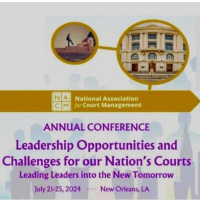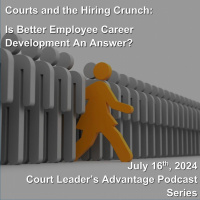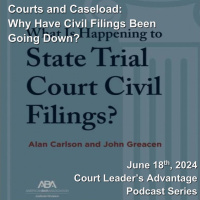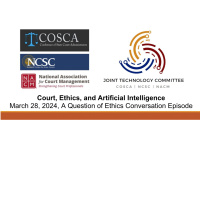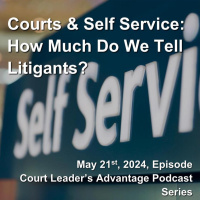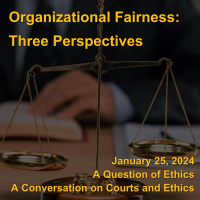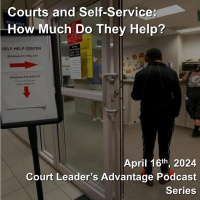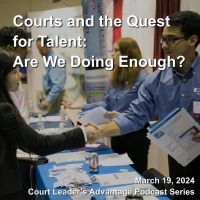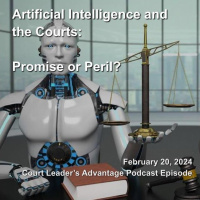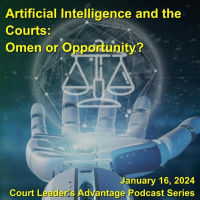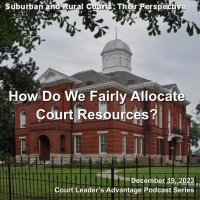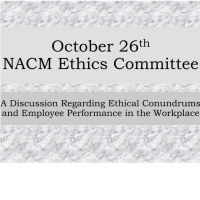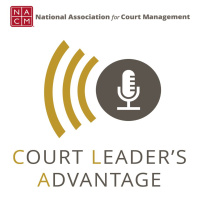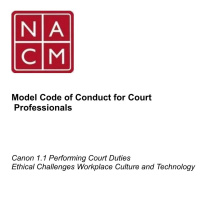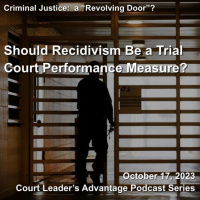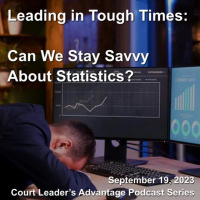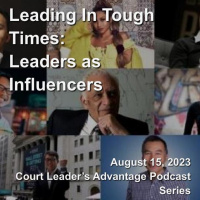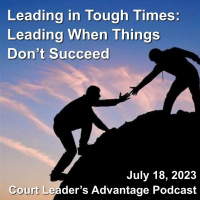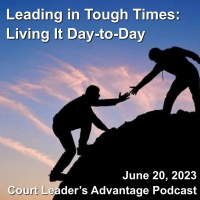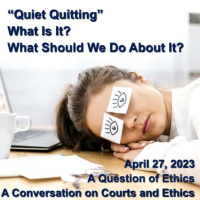Sinopsis
Coming innovations, thought-provoking trends, questions that matter to the court community, these and more themes are covered by the Court Leaders Advantage podcast series, a forum by court professionals for court professionals to share experiences and lessons learned.
Episodios
-
NACM in New Orleans 2024: What Was Your Biggest Takeaway?
18/08/2024 Duración: 22minAugust 20th 2024 Court Leader’s Advantage Podcast Episode The 2024 NACM annual conference brought together court professionals from across the country to share best practices, address common challenges, and discover innovative solutions. Titled Leadership Opportunities & Challenges for Our Nation’s Courts: Leading Leaders into the New Tomorrow, it convened a dynamic mix of professionals, including many emerging voices in the field, who are passionate about the future of our judicial system. From discussions on the latest technological advancements like AI to strategies for enhancing access to justice, the conference provided a rich platform for learning and collaboration. This month we are asking young court professionals the question, “What was your biggest takeaway from this year’s NACM Conference?” You will hear directly from young attendees about valuable insights, practical tools, and inspiring connections. Whether you are a seasoned administrator or just starting on your career, this episode wil
-
Courts & the Hiring Crunch: Is Better Employee Career Development An Answer?
15/07/2024 Duración: 38minJuly 16th, 2024, Court Leader’s Advantage Podcast Episode In previous podcasts, we have discussed the unprecedented hiring crunch facing our country. Intensified by the COVID-19 pandemic, it has been characterized by a significant mismatch between the supply of, and demand for young talent. Despite robust economic recovery efforts, employers in general and courts in particular are struggling to fill empty desks. All the while, jobseekers are running up against barriers that make traditional careers less attractive. Throughout this challenge, a question badgers many employers: What do young job applicants want? Panelists on previous episodes have suggested a lack of flexible scheduling, hybrid work options, and career advancement opportunities as reasons job seekers go elsewhere. Are these the factors now driving job candidates or does it just come down to money? This month we will take a deeper dive into how courts are scrambling to recruit and retain skilled employees. Questions we will explore incl
-
Courts and Caseload: Why Have Civil Filings Been Going Down?
17/06/2024 Duración: 36minJune 18th Court Leader’s Advantage Podcast Episode Civil filings are falling. They have been for some time. In fact, most court filings have been on a slow decline. In 2018, The National Center for State Courts put out a bulletin stating that nationally every major case category had declined from 2008 to 2016. There are indications that in some states (California for example), the decline in civil filings started as far back as 1980. This gradual decline seems little affected by economics, court organization, the presence or absence of court self-help centers, the state of the local bar, the type of case management system the court uses, or the amount of filing fees charged. With the possible exception of Texas, this decline appears widespread. This inevitably leads to the critical yet unanswered question “Why is this happening?” This month we’re talking about a new book just out by Alan Carlson and John Greacen called What is Happening to State Trial Court Civil Filings? We will explore questions
-
Court, Ethics, and Artificial Intelligence
27/05/2024 Duración: 42minMarch 28, 2024, A Question of Ethics Conversation Join Kevin Bowling as we discuss the ethical issues surrounding the burgeoning topic of courts’ use of artificial intelligence (AI). Kevin discusses a definition of AI and specifically generative AI, existing practical uses in the courts, some misuses of IA, the need for policy and data governance, ethics issues, and the need for transparency to promote public trust and confidence. Kevin also publicly acknowledges the work of Roger Rand and Casey Kennedy, the entire Joint Technology Committee, as well as gives a sneak peek of the, soon-to-be-released, NACM AI Guide. Moderator Kevin Bowling, Retired Circuit Court Administrator, Ottowa County, Michigan Joining in the Conversation Courtney Whiteside Director, Municipal Court, St. Louis, Missouri Creadell Webb: Chief Diversity, Equity, and Inclusion Officer; First Judicial District, Philadelphia, Pennsylvania Erika Schmid, Supervisor, Multnomah County Circuit Court, Portland, Oregon Stacy Worby: State
-
Courts and Self-Service: How Much Do We Tell Litigants?
20/05/2024 Duración: 34minMay 21st Court Leader’s Advantage Podcast Episode Although they are not universally accepted, court self-service centers can help prepare self-represented litigants to navigate the exotic terrain of the courtroom. They can also expedite court proceedings and weed out inappropriate arguments. Less obvious but equally as important, the information these centers provide helps boost the public’s trust and confidence in the courts. We well know that the public’s perception of courts has been woefully lagging over these last several years. A basic tenet of self-service centers, in fact, a tenet of all public-facing court staff is “we cannot give legal advice.” Yet this prohibition is more nuanced than it first appears. There are a host of questions that seem more procedural than legal. Questions many self-represented litigants may not even know enough to ask about. How much should courts tell litigants? How much information should courts volunteer even if the litigants don’t know to ask? This month
-
Organizational Fairness: Three Perspectives
22/04/2024 Duración: 22minJanuary 25, 2024, A Question of Ethics Conversation Episode Welcome to the latest episode of A Question of Ethics Conversation. The topic for this discussion is Organization Fairness. The October 26th, 2023, Question of Ethics Conversation hosted by Samantha Wallis, brought up many interesting questions. One set of questions revolved around the concept of fairness. We are all dedicated to fairness and take it seriously, Canon1.3 of NACM’s Model Code for Court Professionals speaks to fairness. It reads that the court professional makes the court accessible and conducts his or her business without bias or prejudice. The Model Code actually mentions Fairness nine different times. Fairness, however, is subjective. Everyone has their own idea of what is fair. What I consider fair may not be the same as how you see things. What are the perceptions of fairness in an organization, particularly a court organization? Employees often express perceptions of fairness, with which we, as managers, might disagree. Alth
-
Courts and Self-Service: How Much Do They Help?
15/04/2024 Duración: 27minApril 16th Court Leader’s Advantage Podcast Episode It may have started with the advent of no-fault divorce in the 1970s. But the numbers of litigants representing themselves in court has regularly increased year after year. This fact has presented a challenge for the community and for courts. People pursuing legal matters in court and who have limited legal experience are at a decided disadvantage. They are at greater risk of ending up with an unfortunate (or maybe even a disastrous) outcome. Likewise, unschooled self-represented litigants in a courtroom can be time-consuming and lead to uncomfortable situations for litigants, judges, and court staff. As a result, many courts around the country have created centers to assist self-represented litigants in pursuing their cases and appearing in court. The presence of court self-service centers is a mixed bag. Not all courts have them and the centers themselves can range from the very modest to the very extensive. This month we’re going to look at self
-
Courts and the Quest for Talent: Are We Doing Enough?
18/03/2024 Duración: 35minMarch 19th Court Leader’s Advantage Podcast Episode In April of 2022, we hosted a podcast episode on “The Great Resignation.” At the time large numbers of employees were resigning, or (after being furloughed for some period) were deciding not to return to work. The assumption back then was that this was a temporary phenomenon. Once COVID receded, people would return to work, and things would get back to normal. It is now a year and a half later. COVID is receding, (or at least we think it is). Yet many courts still struggle with staffing shortages. And this is not just limited to courts. The World Bank has predicted that over the next decade, the number of people of working age in the U.S. (between 15 and 65) will decline by over 3 percent. This is a prospect that courts will find increasingly challenging. This month we’re going to look at ongoing staff shortages and the battle courts are having to recruit new talent. Not every court is short-handed; not all positions suffer from chronic vacancies. O
-
Artificial Intelligence and the Courts: Promise or Peril?
19/02/2024 Duración: 35minFebruary 20, 2024, Court Leader’s Advantage Podcast Episode The advent of artificial intelligence (AI) has spawned numerous questions, both practical and ethical. These are questions that courts are going to have to grapple with in the near future, including: Given the complexity of AI algorithms and the tens of thousands of data points used for training, can we reasonably expect that a human reviewing AI results would actually uncover bias or uncover anything significant? Our court system is designed to move in a slow and deliberate fashion to render decisions; AI is evolving at breakneck speed. Can we afford to wait years for courts to answer questions about AI if it is changing by the month? AI uses data as training to make better decisions in the future. Since it does not publicly reveal sensitive or confidential information about individuals, are privacy concerns about AI irrelevant? Automated chatbots can save time, save money, and provide a sympathetic ear for litigants who want to tal
-
Artificial Intelligence and the Courts: Omen or Opportunity?
17/01/2024 Duración: 45minJanuary 16th Court Leader’s Advantage Podcast Episode Artificial Intelligence. The media is filled with discussions of its potential to dramatically change our lives. It will increase productivity; it will relieve us from having to make mundane decisions; it will reveal heretofore unseen connections. Conversely, it may eliminate jobs, take away our ability to make complex decisions, fill the airwaves with misinformation, and even threaten our way of life. In addition, many think that artificial intelligence (AI) is just too obscure. It is, frankly, not that important to normal people and everyday life. Some of the questions we will explore include: Are there real day-to-day applications of AI affecting courts now? Is AI applicable just for large metropolitan courts or is it also a tool for suburban and rural courts? Are there aspects of AI that courts need to safeguard against mow? Here to discuss these questions are: Kevin Bowling: retired court administrator for the Circuit Court in Ottawa Coun
-
Suburban and Rural Courts: Their Perspective How Do We Fairly Allocate Court Resources?
18/12/2023 Duración: 32minDecember 19th, 2023, Court Leader’s Advantage Podcast Episode The struggle to equitably and effectively allocate court resources is a challenge that faces every state. Everywhere the question is the same: how do you allocate funds fairly to courts of different sizes and may even perform different operations such as having a Treatment Court? How do you not disadvantage suburban and rural courts when taking into account the size of each court, its caseload, the demand for service, the degree of innovation, the staffing needs of justice partners like the prosecutor, the public defender, probation, and law enforcement, allocation history, and special circumstances? Additionally, many court budget staffing discussions are not held on a statewide level, they are local discussions where a court might find itself competing with the police, sanitation, or parks and recreation. What do these courts use to convince funding bodies to provide new resources? Add to the mix the specter that some funding bodies (often c
-
Employee Performance in the Workplace: Ethical Conundrums
04/12/2023 Duración: 32minOctober 26, 2023, A Question of Ethics Conversation Episode Today’s Question of Ethics Conversation looks at several ethical challenges regarding employee performance. It discusses four questions many supervisors face in their oversight role. Can you, as a supervisor, remain friends with colleagues once you have become their boss? This is an especially critical question when it comes time to promote someone, and you promote your ‘friend’. -Are performance reviews good or bad? Are they useful tools for supervisors and managers? -Is it ethical to use a personal relationship to get promoted in the workplace? Is it ethical to treat each worker differently instead of having the same rules for everyone? (i.e., working from home)? This Question of Ethics Conversation looks at how technology plays a role in workplace culture for court users, for one’s co-workers, and on a court’s institutional knowledge. Today’s Moderator Samantha Wallis: Deputy Trial Court Administrator, Supreme Court, Coeur d’Alene,
-
Suburban and Rural Courts: Their Perspective Do Remote Hearings Pose Special Challenges?
20/11/2023 Duración: 38minNovember 21st, 2023, Court Leader’s Advantage Podcast Episode Suburban and rural courts often face distinctive issues. These issues are different from those of truly small courts, but also different from the issues faced by massive metropolitan court organizations. It is tempting to always talk about big problems in big courts. It is easy to forget that two-thirds of the courts in our country are benches made up of fewer than 10 judges. Today’s episode is going to revisit a relatively recent phenomenon: remote hearings. But it is going to look at it from the perspective of courts that are sometimes overlooked: suburban and rural courts. As recently as 2019, remote hearings were an oddity. Few courts offered them; few parties asked for them. Then came COVID and remote hearings became a regular part of many court calendars. The long-term future of remote hearings is still a question mark. Most litigants, attorneys, and the general public seem to enjoy the convenience of appearing remotely. Judges seem l
-
Courts, Workplace Culture, and Technology
22/10/2023 Duración: 41minAugust 24, 2023, A Question of Ethics Conversation Episode Today’s Question of Ethics Conversation looks at workplace culture and technology. It focuses on the ethical challenges to workplace culture and technology as it pertains to Canon 1.1 of the NACM Model Code of Conduct which states that a court professional faithfully carries out all appropriately assigned duties, striving at all times to perform the work: Diligently - characterized by steady, earnest, and energetic effort. Efficiently - capable of producing desired results with little or no waste (as of time or materials) Equitably - dealing fairly and equally with all concerned Thoroughly - in a complete or thorough manner Courteously - marked by respect for and consideration of others Honestly – without cheating, genuine, without frills Openly -exposed to general view or knowledge Within the Scope of the court professional’s authority. According to the Society for Human Resou
-
Should Recidivism Be a Trial Court Performance Measure?
16/10/2023 Duración: 21minOctober 17th Court Leader’s Advantage Podcast Episode In the middle of last month’s episode, the question was asked, should recidivism be a trial court performance measure? All the panelists responded negatively, but the reasons they gave are worth hearing. We have all heard the criticism that the criminal justice has turned into a “revolving door.” Defendants are arrested and tried, most are convicted and sentenced. Some are incarcerated, others are placed on probation. The recidivism rate for incarcerated defendants is nearly 50%; almost one out of every two incarcerated defendants is rearrested. The recidivism rate for defendants on probation is not much better. 43% of probationers are rearrested within 3 years. Traditionally, there are four main purposes of criminal justice sentencing. 1) Incapacitation, 2) punishment, 3) deterrence, and 4) rehabilitation. Rehabilitation as a goal is not easily measured and yet it seems as if it is one of the standards by which the public gauges the success of the
-
Leading in Tough Times: Can We Stay Savvy About Statistics?
18/09/2023 Duración: 31minSeptember 19th, 2023, Court Leader’s Advantage Podcast Episode As court leaders, we are inundated with statistics and research. We have all been taught to have a healthy skepticism of statistics. We are given advice that includes: ask questions, go to the source of the research, and expose the assumptions behind the analysis. We have seen what happens when research is not properly evaluated. As a consequence, we are compelled to ensure that statistical analysis is objective and unbiased, valid and reliable, able to be replicated, and relevant to the work of your court. Having a healthy skepticism is all the more important in this day and age of polarizing misinformation. Most of us have heard that old joke “73.6% of all statistics are made up on the spot.” We don’t want to be the one who is naïvely hooked by questionable statistical research. This advice is all so easy to give, but just how do we hone our critical thinking skills? Imagine this common scenario, you are in a session with 500 attendee
-
Leading in Tough Times: Leaders as “Influencers”
13/08/2023 Duración: 33minAugust 15th, 2023, Court Leader’s Advantage Podcast Episode Leaders deal with multiple circles of individuals. Two that you as a court administrator or Clerk of Court deal with are 1) those who report to you and 2) those you either report to or deal with as fellow stakeholders. Those reporting to you include your team, and the larger office or court staff. The next circle centers on your Presiding Judge, and your bench; it includes your funding body such as your City Council, County Board, the state administrative office, or the state legislature. It extends to your fellow justice partners such as the Sheriff, the Prosecutor, the bar, and community organizations. The leadership skills needed to deal with both circles include team building, mentoring, strategic thinking, organization, persuasive speaking, and concise effective writing. But you deal with your fellow stakeholders (principally your judges), differently than with your court staff. Your judges are leaders in their own right; usually, they
-
Leading in Tough Times: Leading When Things Don’t Succeed
12/07/2023 Duración: 25minJuly 18th, 2023, Court Leader’s Advantage Podcast Episode As one progresses higher in an organization the challenges of leadership can become a regular test. Increasingly responsible positions can draw leaders away from the very people they first came to rely on. The demands of those you report to can outweigh the needs of the people who support you. How do you keep grounded with the people who depend on you for Leadership? And what happens when things do not go well? Not every plan succeeds. How do you lead when the court must close a project or endeavor because it is not achieving the expected results? Finally, great leaders are intuitive. They possess the emotional intelligence necessary to provide staff with the motivation they need to continue working toward an organization’s mission. What part does emotional intelligence play in Leadership? This month we’re looking at leadership in the courts. Keeping in touch with staff, leading when a plan is not successful, and the role of emotional in
-
Leading in Tough Times: Living It Day-to-Day
19/06/2023 Duración: 33minJune 20th, 2023, Court Leader’s Advantage Podcast Episode Is there another concept in court administration that has been discussed, studied, and analyzed more often than Leadership? For many the image of a leader that immediately comes to mind is the person who confidently says, “follow me, I know the way.” It implies that the leader can always be relied upon to “have the answers.” That image, however, doesn’t always work. Sometimes the outcome is being negotiated and cannot be revealed, sometimes the solution is dictated by someone else. Examples that come to mind include how to manage flex time and remote work, how to absorb a 10% budget cut, or how to oversee diversity, equity, and inclusion in your court. This month we’re looking at leadership in the courts and how we handle day to day challenges. Today we are going to ask folks who deal with questions of leadership on a daily basis. Today’s Panelists Stacey Fields, Court Administrator for the Municipal Court in Crestwood, Missouri. Stacey h
-
“Quiet Quitting”: What Is It? What Should We Do About It?
11/06/2023 Duración: 34minApril 27, 2023, A Question of Ethics Conversation Episode “Quiet Quitting.” It is a topic that many of us have heard about. In an era where it is a challenge to hire employees, is “Quiet Quitting” an emerging change in the contract between the court and employees or is it just a new term for some staff not doing their jobs? In the past it has been given many names: “retiring in place”, “phoning it in,” or “checking out.” What makes this iteration unusual is that it seems to be a mantra heard from younger workers. Millennials and Gen Z workers have often uttered this expression. -What is Quite Quitting? -What are the ethical challenges the court faces to ensure professionalism diligence of staff? -How can we ensure that we have a common understanding with staff? -Is this a new term for an old problem? -What Should we do about It? Today’s Moderator Eric Silverberg: Court Administrator, Municipal Court, Tucson, Arizona Today’s Panel Courtney Whiteside: Director, Mu

